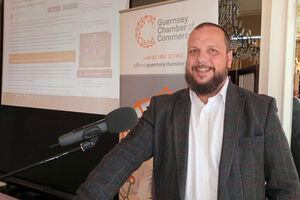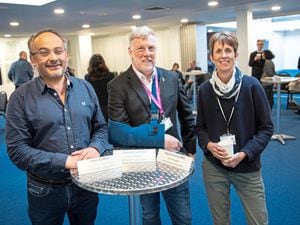‘Island must prepare for tech revolution and its opportunities’
GUERNSEY must prepare for a technology revolution that could see new opportunities arise and current jobs disappear.

Justin Bellinger, chief digital officer at telecoms company Sure, stressed the need for businesses to actively consider the impact of robotic process automation and artificial intelligence both in terms of impact of current jobs and future prospects.
‘It’s administrative jobs that will be replaced by things like robotic process automation; will be replaced by artificial intelligence,’ said Mr Bellinger addressing the monthly Guernsey Chamber of Commerce lunch at the Old Government House Hotel.
‘Even if the robots do it at the same speed as us, as the people, it still gives us massive efficiencies and will present a massive risk to us as an island.’
White-collar workers, people in the law and even retail staff could be affected by the so-called fourth industrial revolution, he said.
‘It’s incumbent upon all of us in this room to understand what we can do to transform our businesses, to try and nudge our businesses in the right direction,’ said Mr Bellinger, who stressed the need to ‘win hearts and minds’.
‘We need to use these tools to change our operating models. We need to use these tools to gain customer insights. We need to use those tools to understand more about our businesses – and how we can move them along.
‘But most important, we need to be conscious about digital disruption at a strategic level. We need our chief executives to understand what’s happening in the world and to understand how we’re going to react as a business.’
Mr Bellinger said Sure was supporting this through industry forums and events, working with the island’s Digital Greenhouse and supporting a digital internship.
Internally, the company has a scheme supporting innovation and ‘mini-apprenticeships’ as well regular group-wide discussions and careful measuring of data.
There were also opportunities with people having more time to talk and think, analyse and provide insights as a result of technological change. People could move to roles that added value to a business, spend more time with clients or patients, he suggested.
‘You can’t disrupt creativity or insight, so in a way it will give us the ability to free up our time with the right training. That’s why we’re here today talking about this. With the right guidance and training, we can look forward to convert our skills into something more meaningful – either something that derives more profit or gives us more personal enjoyment.’
Colin Vaudin, chief information officer at the States of Guernsey, said the whole island needed to work together in the face of technological change in response to Mr Bellinger’s address.
‘Guernsey is exceptionally well-placed to take advantage of these opportunities and to mitigate the threats if we want to work together to do it.
‘It cannot just be a role for government, albeit it an important one.
‘It is the entrepreneurs, regulators and society getting together,’ said Mr Vaudin.





